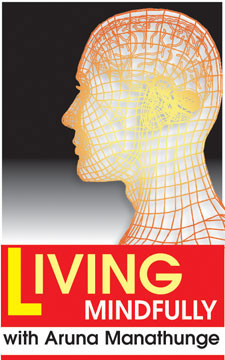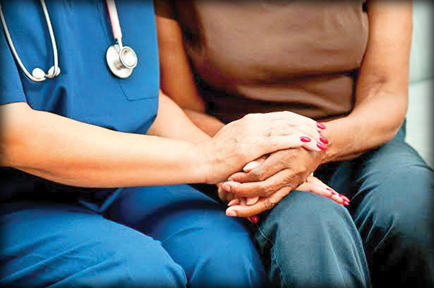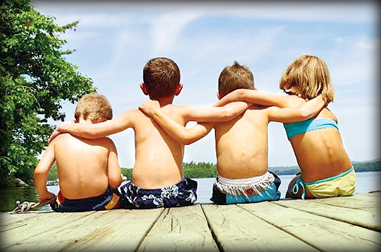|
Living Mindfully
Benefits of Mindfulness in Education - Part 8:
Mindful Kindness
 Continuing from where we left off last week, we delve deeper into the
importance of developing Kindness on a foundation of Mindfulness. Continuing from where we left off last week, we delve deeper into the
importance of developing Kindness on a foundation of Mindfulness.
Recently
a group of scientists, using statistical technique called Meta-analysis,
combined the findings from a large number of independent clinical trials
on Mindfulness conducted on school children, arrived at a general
consensus that the strongest effects of school based Mindfulness were on
cognitive performance (the mental ability to acquire knowledge,
perception, intuition and reasoning).
Only moderate improvements were noted in emotion and resilience.
The finding in children was different to the results found among the
adult populations, where Mindfulness training produces a marked
improvement in overall well-being due to improvements in emotion and
resilience, in addition to cognitive enhancements.
These results in school children might have happened due to the
nature of introductory Mindfulness programs in schools. In those
programs, the overt emphasis is on attention and awareness training
through focused meditation. There is less emotional and experiential
group reflection and enquiry than in adult courses.
 Another reason could be the developing nature of the child and even
adolescent brains. The prefrontal cortex (PFC) and anterior cingulate
cortex (ACC) that are centrally involved in error processing, attention
monitoring and control are still developing in adolescents. Adolescents'
impulsivity directly relates to the underdeveloped nature of these
frontal brain regions. Another reason could be the developing nature of the child and even
adolescent brains. The prefrontal cortex (PFC) and anterior cingulate
cortex (ACC) that are centrally involved in error processing, attention
monitoring and control are still developing in adolescents. Adolescents'
impulsivity directly relates to the underdeveloped nature of these
frontal brain regions.
Research has also found links between impulsivity and adolescent
risk-taking behaviours.
Developing Kindness
The latest trend of incorporating the practice of Kindness into
school Mindfulness programs may help to improve the emotional
development of children better. However, this practice needs to be
introduced on a strong foundation of Mindfulness to obtain optimum
results.
In
the 12-week kindness curriculum developed by the Center for Healthy
Minds, the children learn to develop Empathy and Compassion in addition
to Mindfulness. Their curriculum is mainly developed on the following;
Attention: Students learn what they focus on is a choice. By focusing
attention on a variety of external sensations (sound of a bell, look of
a stone or a raisin) and internal sensations (feeling happy or sad),
children learn that they can direct their attention and maintain focus.
Breath and the Body: A creative activity was developed to teach the
pre-kindergarten children about breath and the body. The children rested
on their backs with a baby doll on their belly. They were asked to 'rock
the baby' to sleep with natural in- and out- breathing noting "breathing
in" and "Breathing out".
Adolescents are taught to develop awareness through the sensation of
touch - both through the direct touch of the body on the seat or floor
and through the subtle sensation of the movement of air in breathing.
Caring: The students are guided to think about how others feel and to
cultivate kindness.
Dependence on other people: They learn that everyone supports and is
supported by others from kindergarten level. The small children learn
books such as Somewhere Today, which describe acts of kindness that are
going on in the world right now.
The older adolescents could be encouraged to present such real life
cases. Students learn to see themselves as helpers and begin to develop
gratitude for the kindness of others.
Emotions: They learn to express and talk about emotions. What do
emotions feel like and look like? How could you tell what you are
feeling (anger, sadness, happiness or surprise)? They specifically learn
how each emotion feel in the body.
 Forgiveness:
Children (and even adults) can be particularly hard on themselves and
others. The children are taught to accept that everyone makes mistakes
and they learn to forgive - first themselves and then the others. Forgiveness:
Children (and even adults) can be particularly hard on themselves and
others. The children are taught to accept that everyone makes mistakes
and they learn to forgive - first themselves and then the others.
The practice of 'Developing Kindness' meditation is specifically
helpful in older adolescents.
Gratitude: The pre-kindergarten students of the 12-week study were
taught and guided to note and recognize the kindly acts other people do
for them.
The students who went through the curriculum showed more empathy and
kindness and a greater ability to calm themselves down when they felt
upset.
(Aruna Manathunge has practiced Mindfulness for over 43 years. He
conducts Coaching in Mindfulness for Schools and Companies and can be
contacted at
[email protected]) |

